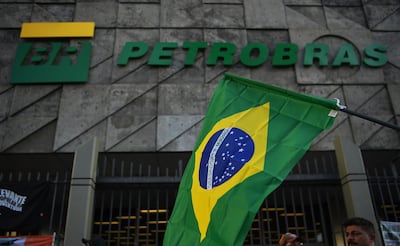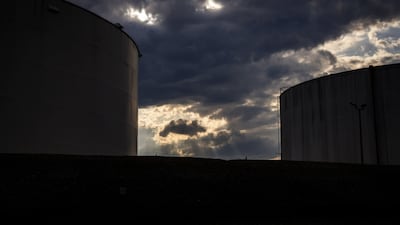Live updates: Follow the latest news on Cop28
Opec negotiations have become almost as complex as the Byzantine world of climate diplomacy. The delay to the oil exporters’ talks made them coincide with Cop28, another Middle East-centric event in which the needs of Africa and Latin America feature prominently. As the group struggles to balance the imperatives of market share and prices, a helping hand would be welcome.
The latest deal on production targets seems to exceed the market’s pre-meeting expectations for a rollover of production levels. But it has had a limited effect on prices, mainly because nobody can work out what it means. Brent crude dropped from $82.83 per barrel on the day of the discussions to $79 on Friday.
From the relatively simple matter of saying how much oil Opec will produce and over what period, we now have a welter of targets, baselines, voluntary cuts, export cuts and curbing overproduction. Because the new cuts are considered voluntary, countries publish them individually rather than having an agreed Opec statement, making it hard to aggregate.
Results depend on how we assess Russia’s promise to cut exports of fuel oil, the extension of the voluntary cuts by Saudi Arabia and Russia, the UAE’s cuts – but from its promised higher baseline next year – Iraq’s reductions versus its current under-compliance, and African members’ inability to produce up to their target levels. Apparent additional cuts of about 900,000 barrels per day might in reality turn out to be 600,000 bpd or less.
Saudi Arabia’s voluntary cut has proved a successful tool – since it could be withdrawn at any point, it serves to threaten recalcitrant members with a sharp drop in prices if they do not sign up for cuts.
But it should be a major concern to Riyadh that despite the strong post-pandemic demand rebound, its production this year is still likely to be lower than in 2014, the year when prices slumped. And Opec’s total output is about 3 million bpd less than it was then.
So, of more significance than the production levels – which can be revised at any time – is a fundamental structural change.
Brazil’s President Luiz Inacio Lula da Silva is in Dubai for Cop28, as part of a tour that also takes in Germany, Saudi Arabia and Qatar. Brazil's energy minister Alexandre Silveira told the Opec meeting that his country would join the charter from next year.
On the face of it, the promised accession of Brazil is a coup. Forecast to gain 370,000 bpd this year, it is the biggest non-Opec contributor to global oil production growth after the US. With 3.7 million bpd of total crude output, it would be the fourth-largest Opec producer, after Russia, Saudi Arabia and Iraq, adding almost 4 percentage points to the group’s market share and taking it well over half of the global total.
For now, Brazil won’t be bound by production restrictions. Jean Paul Prates, chief executive of state oil company Petrobras, said that Opec “is aware that Brazil can’t be subject to quotas as it has a publicly traded company”.
Just over half of Petrobras’s common stock is held by Brazilian government entities, and the rest by private investors. That condition applies to several other Opec countries, though – even Saudi Arabia, as well as Russia.
Indeed, Petrobras has ambitious expansion goals. It has budgeted to spend $102 billion over the next five years, up 31 per cent from the previous five-year period, and 72 per cent of which is directed to oil and gas exploration and production.

The International Energy Agency thinks that by 2027, Brazil and neighbouring Guyana will eclipse the US as the main contributors to non-Opec production growth, with Brazil adding one million bpd by 2028.
It would not make sense for Brazil to constrain its growth, in addition to current major projects in its famous “pre-salt” deepwater offshore area. It is also exploring new areas including its northern Equatorial Margin, seeking to find an extension of Guyana’s prolific geology.
But the odds have just dramatically increased that, if there were a sharp price drop, another global financial crisis or a Covid-type shock, Brazil would help out with production cuts. And, as the Opec experience after the pandemic illustrates, temporary cuts easily become quasi-permanent.
So Brazil’s accession doesn’t put a ceiling on oil prices, but it does strengthen the floor. Guyana won’t join Opec while still in its phase of rapid growth, so Brazil was about the only remaining large candidate.
Now, the spectre of future production curbs might deter some investment in one of the few leading oil producers that continues to attract western majors.
The political significance and symbolism are yet more important. It would be the second of the original five Brics nations to join Opec+. The UAE, Saudi Arabia and Iran were also invited in August to join the bloc.
As an independent-minded but generally western-friendly power, the South American country brings a large population, economy, political clout and credibility with developing countries. Alongside its oil and gas sector, it has a world-leading biofuels programme and is a large hydropower leader.
It is a crucial steward of the Amazon rainforest, after the previous attempts of former president Jair Bolsonaro to open its vulnerable ecosystems for mining, ranching and logging.
Mr da Silva probably surprised his colleagues-to-be when he declared at Cop28: “I think it's important for us to take part in Opec, because we need to convince the countries that produce oil that they need to prepare for the end of fossil fuels.”
So Brazil offers at least moral support in the quest of Opec to regain a decade of production cuts without crashing prices again. In any renewed crisis, its practical help could be very useful. And it could help to shift the dialogue within the oil exporters’ group: from market micromanagement to wider goals of reconciling petroleum production with climate.
Robin M Mills is chief executive of Qamar Energy and author of 'The Myth of the Oil Crisis'



























